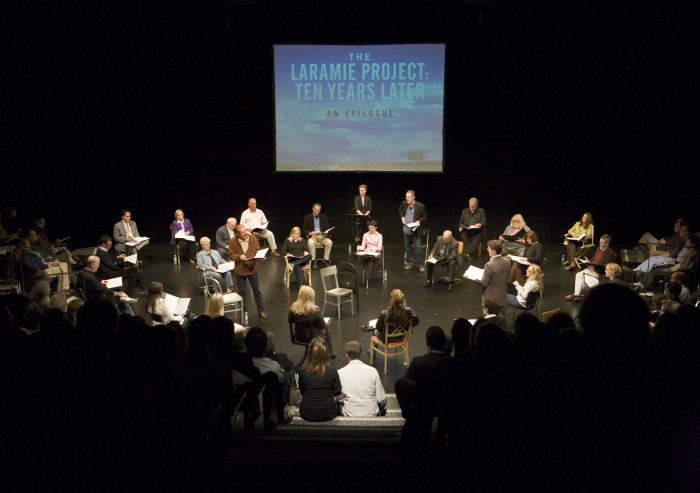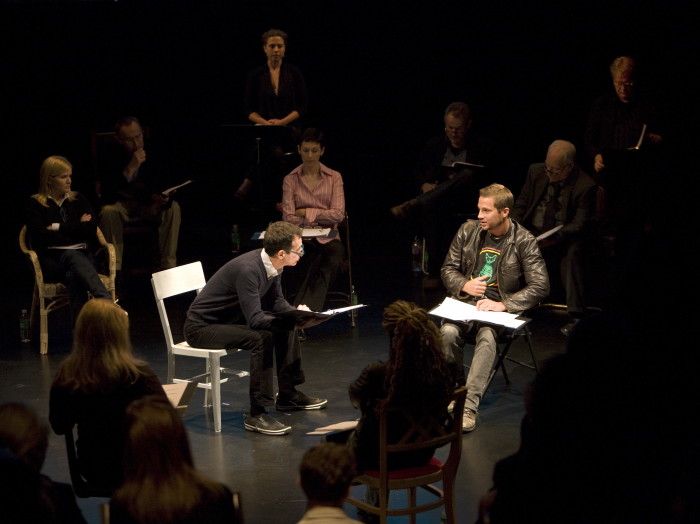The Laramie Project: Ten Years Later, An Epilogue, a new play by Moises Kaufman, Leigh Fondakowski, Greg Pierotti, Andy Paris and Stephen Belber, directed by Darko Tresnjak
Staged reading, La Jolla Playhouse, La Jolla, CA, October 12, 2009
With: Nancy Anderson, Colette Carson, Kandis Chappell, Michael Covert, Ross Crain, Richard Dreyfuss, Tom Dugdale, D. A. Bonnie Dumanis, Wayne Duvall, Robert Foxworth, Monique Gaffney, City Councilman Todd Gloria, Catherine Gowl, Allyson Green, Brian Huynh, Trina Kaplan, Pat Launer, Logan Marshall-Green, Kern McFadden, Kathryn Miesle, Amanda Naughton, James Newcomb, Steve Marzoff, Mayor Jerry Sanders, Lisa Sanders, Stark Sands, T. Ryder Smith, James Sutorius, Bruce Vilanch, Jessica Watkins, Anne Marie Welsh, James Winker, Mare Winningham, Sam Woodhouse, Doug Wright
Above, top: ensemble; below: T. Ryder Smith and Logan Marshall-Green
North County Times, Pam Kragen – Play readings aren’t usually a hotbed for edge-of-your-seat drama, but that was the mood in the room Monday evening when the La Jolla Playhouse presented a sold-out, celebrity-packed reading of Tectonic Theater Project’s new play, “The Laramie Project: Ten Years Later, An Epilogue.”
The Playhouse was one of more than 100 theaters worldwide that participated in simultaneous readings on the 11th anniversary of the death of Matthew Shepard, the gay Wyoming college student whose brutal murder inspired Tectonic’s original play, “The Laramie Project,” in 2001.
Thirty-two film, television and stage actors, writers and directors, as well as a few local political figures, lent their voices to the local reading (the only one held in San Diego County), which was presented as a fundraiser for the Hillcrest Youth Center.
Staged in the Playhouse’s Forum theater by director Darko Tresnjak in town-hall-meeting style, the actors wore no costumes, carried no props and simply rose from their chairs to deliver their lines. But the power of their words, and the passion and nuance with which they spoke, moved much of the audience to sit in rapt anticipation, nod their heads, cheer spontaneously, cry and give a well-deserved standing ovation.
The new play is the result of a repeat visit last year to Laramie, Wyo., by Tectonic theater members, who returned to see how the people, places and politics had changed in the decade since Shepard’s death.
On Oct. 6, 1998, the 21-year-old University of Wyoming student accepted a ride from two men he met in a Laramie bar, Aaron McKinney and Russell Henderson, who ended up robbing Shepard, then tying him to a fence and viciously torturing him before abandoning him to the elements. He died in a hospital six days later without ever regaining consciousness.
At the subsequent trial, witnesses said McKinney admitted he’d targeted Shepard because he was gay, and the case became a international flashpoint for hate crimes legislation.
The original “Laramie Project” was a documentary-style drama based on hundreds of interviews Tectonic staff conducted with Laramie residents in the aftermath of the slaying and trial. The new play, “10 Years Later,” uses the same format and features many of the same people who were interviewed for the first play, as well as interviews with many other residents and the killers themselves, McKinney and Henderson.
While much has changed in Laramie in the intervening decade, the new play shows with disturbing details that much remains the same. The city’s economy has grown (“We have a Chili’s now!”), gay residents say they’ve found “safe pockets” where they can live without fear, police say they don’t hear the same “epithets” used to describe homosexuals anymore, and an openly lesbian college professor has been elected to state congress.
But much business remains unfinished.
Revisionists have used a widely discredited 2004 episode of “20/20” about Shepard’s murder as grounds for denying that the slaying was a hate crime. Some newspaper editorials, government officials, students and residents cite a gay “agenda” and call Shepard’s death merely a robbery gone wrong, while others have only vague memories of the crime. Reggie Fluty, the now-retired policewoman who found Shepard’s body and fought to save his life, says shame over the city’s homophobic past is driving many Laramie residents to rewrite the facts of the case.
“Shame is a funny thing,” said Fluty, subtly underplayed by Emmy-winning actress Mare Winningham. “We know we’ve screwed up, so we make excuses … point fingers.”
Also, at the time of Tectonic’s 10-year visit, no hate crimes legislation had been passed in Wyoming; gay university staff had no domestic partnership benefits; and a Defense of Marriage initiative was working its way through the state legislature.
Most disturbingly, in a 2008 jailhouse interview, McKinney (chillingly played by edgy “24” actor Logan Marshall-Green) unapologetically states he has no remorse for the killing, and describes Shepard as a “sexual predator” who “needed killing.”
Tresnjak’s cast included a mix of local actors, acting students and celebrities, including Oscar-winning star Richard Dreyfuss, who stood out in a pair of very different roles, as Shepard’s still-grieving father Dennis, and as a showboating Republican legislator touting the virtues of heterosexual marriage.
James Sutorius (now appearing in the Old Globe’s “Savannah Disposition”) was moving as a disillusioned sheriff, and T. Ryder Smith (now appearing in the Playhouse’s “Creditors”) commanded the stage as Tectonic team leader Greg Pierotti.
San Diego actress Kandis Chappel was heartbreaking as Shepard’s mother, Judy. Stark Sands (who will play Clyde Barrow in Playhouse’s upcoming musical “Bonnie and Clyde”) was boylike and gentle as the now-repentant killer Henderson. Bruce Vilanch added welcomed comic relief as gay Laramie resident Jonas Slonaker. Playwright Doug Wright (author of “I Am My Own Wife” and adapter/director of “Creditors”) was gently probing as Tectonic artistic chief Moises Kaufman. And San Diego District Attorney Bonnie Dumanis had a small role as a Laramie resident.
One of the evening’s most impassioned readers was San Diego Mayor Jerry Sanders, playing a Wyoming Republican congressman who refused to endorse the Defense of Marriage act because he has a lesbian daughter. Last year, Sanders, a Republican, refused to support California’s Prop. 8 because he, too, has a lesbian daughter (who also took part in the reading). When Sanders finished his speech, the audience broke into sustained applause.
The actors had just a few hours of rehearsal time to pull together the reading, but it was smooth, well-acted and gripping in its detail. The play would be a perfect vehicle for local community colleges to produce in the coming year. It’s a great showcase for a large group of actors, and it has a lot to say about the fragility of gay rights in America today. 10.14.09
[previous] [next]

